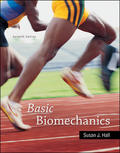
Concept explainers
Why does a force directed through an axis of rotation not cause rotation at the axis?
To explain: The reason for a force which is directed through an axis of rotation did not cause rotation at the axis.
Concept introduction: The effect of rotation caused by applying a force on the object is known as torque. The torque can be found out using the magnitude of force and the length of moment arm.
Explanation of Solution
Write the equation to find the torque.
Here,
When the force is directed through an axis of rotation, the value of moment arm is zero, thus, there will be no torque due to the force applied. Since, the force is not creating any torque; the force which is directed through an axis of rotation did not cause any rotation at the axis.
Want to see more full solutions like this?
Chapter 13 Solutions
EBK BASIC BIOMECHANICS
- Watch this video (http://openstaxcollege.org/l/anatomical) to learn about anatomical motions. What motions involve increasing or decreasing the angle of the foot at the ankle?arrow_forwardIn a general sense, how do skeletal muscles produce movement?arrow_forwardMovement at the shoulder joint that moves the upper limb laterally away from the body is called ________. elevation eversion abduction lateral rotationarrow_forward
- Briefly define the types of joint movements available at a ball-and-socket joint.arrow_forwardThe elbow is an example of which type of joint? hinge pivot saddle glidingarrow_forwardWhich of the following is not a true statement comparing exoskeletons and endoskeletons? Endoskeletons can support larger organisms Only endoskeletons can grow as an organism grows Exoskeletons provide greater protection of the internal organs Exoskeletons provide less mechanical leverage.arrow_forward
- Describe the characteristic structures found at all synovial joints.arrow_forwardWatch this video (http://openstaxcollege.org/l/anklejoint3) to learn about the ligaments of the ankle joint, ankle sprains, and treatment. During an inversion ankle sprain injury, all three ligaments that resist excessive inversion of the foot may be injured. What is the sequence in which these three ligaments are injured?arrow_forwardDiscuss the structures that contribute to support of the shoulder joint.arrow_forward
- Figure 38.37 Which of the following statements about muscle contraction is true? The power stroke occurs when ATP is hydrolyzed to ADP and phosphate. The power stroke occurs when ADP and phosphate dissociate from the myosin head. The power stroke occurs when ADP and phosphate dissociate from the actin active site. The power stroke occurs when Ca2+ binds the calcium head.arrow_forwardWhich statement is tine concerning the knee joint? The lateral meniscus is an intrinsic ligament located on the lateral side of the knee joint. Hyperextension is resisted by the posterior cruciate ligament. The anterior cruciate ligament supports the knee when it is flexed and weight bearing. The medial meniscus is attached to the tibial collateral ligament.arrow_forwardDescribe the structures that provide direct and indirect support for a synovial joint.arrow_forward
 Human Physiology: From Cells to Systems (MindTap ...BiologyISBN:9781285866932Author:Lauralee SherwoodPublisher:Cengage LearningSurgical Tech For Surgical Tech Pos CareHealth & NutritionISBN:9781337648868Author:AssociationPublisher:Cengage
Human Physiology: From Cells to Systems (MindTap ...BiologyISBN:9781285866932Author:Lauralee SherwoodPublisher:Cengage LearningSurgical Tech For Surgical Tech Pos CareHealth & NutritionISBN:9781337648868Author:AssociationPublisher:Cengage Principles Of Radiographic Imaging: An Art And A ...Health & NutritionISBN:9781337711067Author:Richard R. Carlton, Arlene M. Adler, Vesna BalacPublisher:Cengage LearningLifetime Physical Fitness & WellnessHealth & NutritionISBN:9781337677509Author:HOEGERPublisher:Cengage
Principles Of Radiographic Imaging: An Art And A ...Health & NutritionISBN:9781337711067Author:Richard R. Carlton, Arlene M. Adler, Vesna BalacPublisher:Cengage LearningLifetime Physical Fitness & WellnessHealth & NutritionISBN:9781337677509Author:HOEGERPublisher:Cengage





